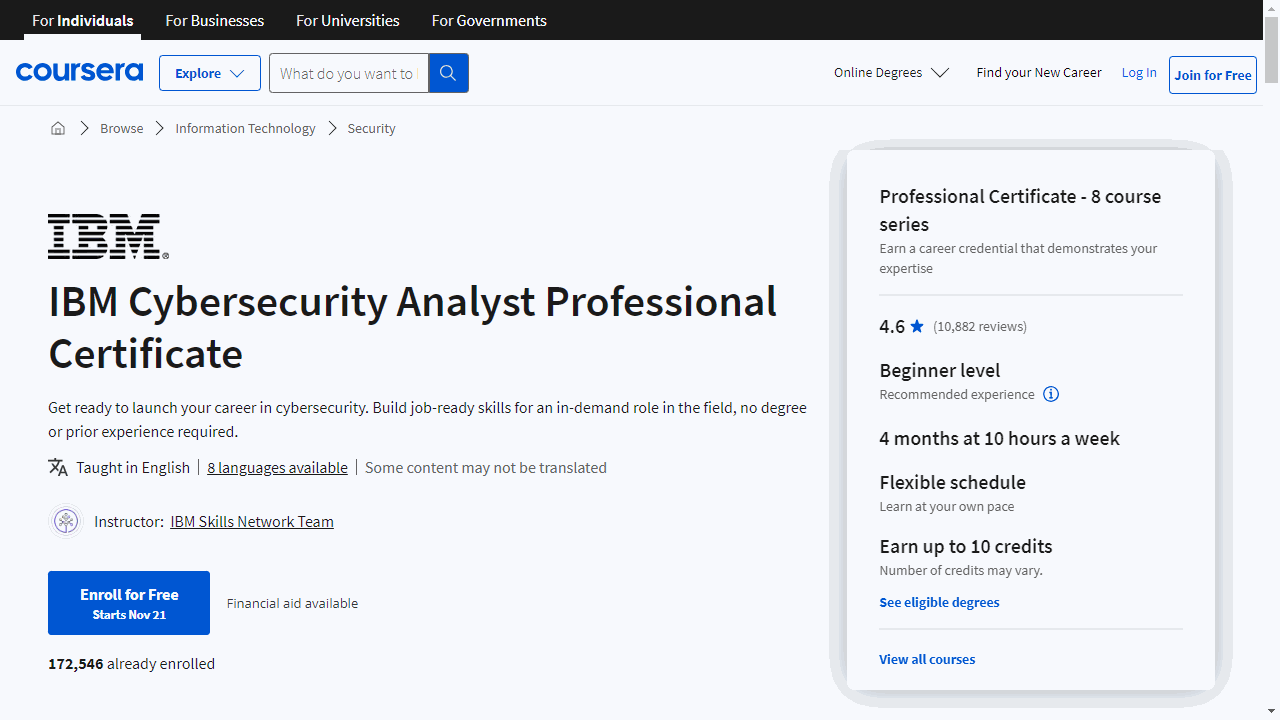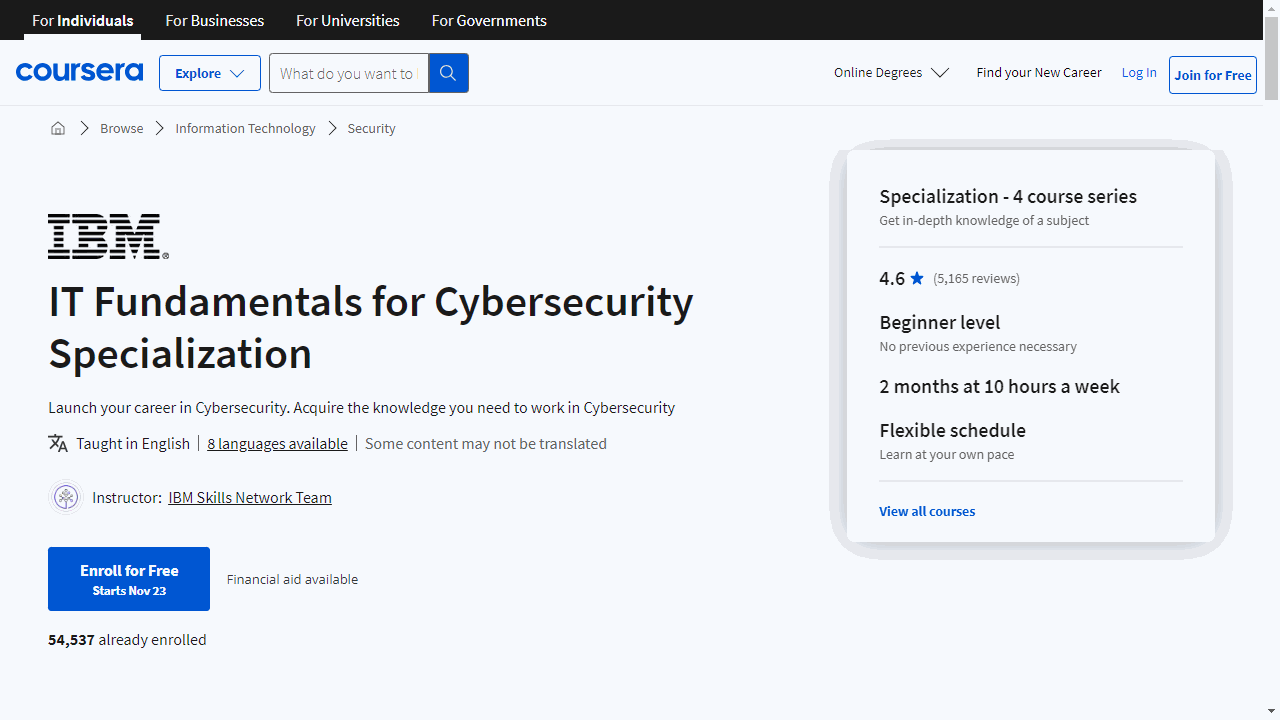Cybersecurity is a critical field in today’s digital world, encompassing the protection of computer systems and networks from unauthorized access, use, disclosure, disruption, modification, or destruction.
With the increasing reliance on technology and the rising number of cyber threats, skilled cybersecurity professionals are in high demand across various industries.
By learning cybersecurity, you can gain valuable skills to safeguard sensitive information, defend against cyberattacks, and contribute to a safer online environment.
Finding a comprehensive and effective cybersecurity course can be challenging, given the vast array of options available.
You want a program that covers essential concepts, provides practical skills, and is taught by industry experts.
For the best cybersecurity course overall, we recommend Learn Ethical Hacking From Scratch.
This Udemy course offers a hands-on approach to learning cybersecurity by exploring the techniques used by ethical hackers to identify vulnerabilities and secure systems.
It covers a wide range of topics, including network security, cryptography, and social engineering, providing you with a solid foundation in the field.
However, if you’re looking for something more specific to your needs or interests, there are other excellent cybersecurity courses available.
Keep reading to discover our top recommendations for beginners, advanced learners, and those interested in specialized areas like network security or ethical hacking.
Learn Ethical Hacking From Scratch
Provider: Udemy
This Udemy course teaches you the skills to start a cybersecurity career.
You’ll learn about different types of hackers, from the good guys (white hats) to the bad guys (black hats).
You will build a safe hacking lab on your computer using programs like VMware to make virtual machines.
These virtual machines will act as different computers, allowing you to practice hacking without hurting your own system.
The course teaches you the Linux operating system and how to use Kali Linux, a special operating system for ethical hacking.
You’ll move on to network hacking, learning how hackers get into Wi-Fi networks and how to protect yourself.
You’ll learn how to crack passwords on Wi-Fi networks secured with WEP, WPA, and WPA2.
You’ll learn about more advanced attacks, like how hackers can secretly listen in on what you’re doing online (Man-in-the-Middle attacks).
The course covers how to use tools like Wireshark to examine network traffic, spotting hackers and dangerous activity.
You’ll use tools like bettercap to intercept data, even breaking through security measures like HTTPS and HSTS.
You’ll learn social engineering, a hacking method that tricks people into giving up information or access to computer systems.
The course teaches you how to make Trojan horse viruses disguised as normal files and how to send fake emails.
You will use powerful hacking programs like Metasploit and BeEF to break into systems and control them remotely.
Finally, you’ll dive into website hacking, finding weaknesses that hackers exploit.
You’ll learn about common website vulnerabilities like SQL injection and XSS, and how to prevent them.
You’ll learn how to use a program called OWASP ZAP to automatically find these weaknesses on websites.
IBM Cybersecurity Analyst Professional Certificate
Provider: Coursera
The IBM Cybersecurity Analyst Professional Certificate on Coursera equips you with the skills needed to become a cybersecurity analyst.
You will start with cybersecurity fundamentals, exploring the history of cyberattacks, learning key terminology, and understanding crucial concepts like the CIA Triad.
You will then delve into cybersecurity roles and processes, learning about operating systems such as Windows, Mac/OS, and Linux, and understanding virtualization.
You will then gain a deep understanding of cybersecurity compliance frameworks and industry standards, including NIST, GDPR, HIPAA, and PCI.
You will learn about server and user administration, along with endpoint security and patch management, crucial for maintaining secure systems.
The program also explores network security and database vulnerabilities.
You will learn about TCP/IP, the OSI framework, and routing basics.
You will explore common database vulnerabilities in systems like SQL, Oracle, Mongo, and Couch.
You will acquire skills in penetration testing, incident response, and digital forensics, including hands-on experience with penetration testing tools and incident response investigations.
You will understand cyber threat intelligence, network defensive tactics, and data loss prevention techniques, along with mobile endpoint protection.
You will learn about scanning technologies, application security vulnerabilities, and threat intelligence platforms.
The program concludes with a capstone project, requiring you to analyze a real-world cybersecurity breach, applying your learned knowledge to dissect the attack and the organization’s response.
Introduction to Cybersecurity Nanodegree
Provider: Udacity
This Udacity Nanodegree teaches you how to keep computer systems safe from cyberattacks.
You will learn about different threats, like viruses and hackers, and how to spot weak points that attackers might target.
The program emphasizes practical skills, teaching you how to use security tools, analyze network traffic, and respond to security incidents.
The curriculum dives into cryptography, which is like creating secret codes to protect information.
You will explore network security, learning how to set up firewalls and intrusion detection systems to stop unauthorized access.
You’ll also gain experience with tools and techniques to analyze security logs and detect malicious activity, equipping you to act as a first responder when security breaches occur.
Beyond technical skills, you will learn about governance, risk, and compliance (GRC), which is like creating rules and guidelines for keeping data safe.
You’ll understand important frameworks and regulations like HIPAA and PCI DSS, which are crucial for protecting sensitive information.
The program even covers career advice, helping you create a standout LinkedIn profile to impress potential employers.
The instructors are experienced professionals like Ron Woerner, who has the CISSP and CISM certifications, and Dr. Christine Izuakor, CEO of Cyber Pop-up.
They bring real-world experience to the program, ensuring you learn practical skills.
CompTIA Security+ (SY0-701) Complete Course & Exam
Provider: Udemy
This CompTIA Security+ (SY0-701) course thoroughly prepares you for the Security+ exam and a cybersecurity career.
You will begin with essential concepts such as confidentiality, integrity, and availability, and progress to understanding various threat actors, their motivations, and attack methods.
You’ll also learn about physical security measures, like fencing and surveillance, and how attackers try to bypass them.
The course then equips you with the knowledge to combat social engineering tactics, including phishing and pretexting.
You will dive into the world of malware, understanding different types like viruses, worms, and ransomware, and learning detection and prevention methods.
Data protection is extensively covered, encompassing data classification, ownership, data loss prevention (DLP), and cryptographic solutions such as AES and RSA.
Furthermore, you will delve into risk management, third-party vendor risks, and the significance of governance and compliance frameworks.
Understanding asset and change management, as well as conducting audits and assessments, including penetration testing, will be key takeaways.
The course also covers building cyber resilience through concepts like high availability and disaster recovery.
You’ll learn about securing different IT architectures, such as cloud environments and those utilizing virtualization and containerization.
Finally, you’ll gain a deep understanding of security infrastructure, including configuring firewalls, intrusion detection and prevention systems (IDS/IPS), and implementing identity and access management (IAM) solutions like multifactor authentication (MFA).
The course doesn’t shy away from exploring specific vulnerabilities, like cross-site scripting (XSS) and SQL injection, and details incident response procedures.
IT Fundamentals for Cybersecurity Specialization
Provider: Coursera
This Coursera specialization teaches you the basic knowledge and skills to understand how cybersecurity works, what threats exist, and how to protect yourself and your organization.
You will start by exploring the history of cybersecurity and how security threats have evolved.
You will learn key terms, such as the CIA Triad (Confidentiality, Integrity, and Availability), and explore basic concepts like access management and incident response.
You will also learn about common cybersecurity tools like firewalls, anti-virus software, and cryptography.
Next, you’ll dive into the different cybersecurity roles within organizations, from security analysts to incident responders, and learn about the important processes they manage.
The training covers operating systems like Windows, Mac/OS, and Linux, and introduces you to virtualization and how it relates to cybersecurity.
You’ll learn about compliance frameworks and industry standards, including NIST, HIPAA, and GDPR, as well as server and user administration, endpoint security, and patch management.
This part of the training will also teach you about cryptography and encryption and how they protect sensitive information.
Finally, you will explore network security, including Local Area Networks, TCP/IP, and the OSI Framework.
You will learn about routing and switching and how network security protects organizations from cyberattacks.
You’ll also gain insights into database vulnerabilities and common attacks like SQL Injection, with a focus on databases like Oracle, MongoDB, and Couch.
Enterprise Security Nanodegree
Provider: Udacity
This program equips you with the skills to safeguard company networks and data from cyber threats.
You’ll delve into essential areas like network security, endpoint protection, application security, and data security, gaining a well-rounded skillset.
Imagine building robust defenses for an entire company.
You’ll learn how to design secure network architecture, implement the latest cybersecurity practices like Zero Trust, and utilize a SIEM system for continuous threat monitoring.
You’ll become familiar with tools and techniques used by professionals in the field.
You’ll then shift your focus to securing individual computers and devices.
You’ll master system hardening to bolster security and explore policies and compliance requirements.
Plus, you’ll learn how to manage security effectively in cloud environments, a critical skill in today’s digital landscape.
Next, you’ll explore the world of application security.
You’ll discover how to design secure applications, proactively hunt for threats, and identify vulnerabilities in containers and APIs.
Through hands-on projects, such as the CryptoV4ULT Enterprise Security Assessment, you’ll apply your knowledge to real-world scenarios, solidifying your understanding.
Finally, you’ll dive into the crucial domain of data security.
You’ll grasp the importance of data governance, ensuring data is managed securely and responsibly.
You’ll learn to protect data confidentiality, integrity, and availability, safeguarding sensitive information from unauthorized access or loss.
This program even includes a project analyzing data security within online payment processing, providing valuable real-world insights.
Risk Management for Cybersecurity and IT Managers
Provider: Udemy
This Udemy course equips you with the knowledge to protect your organization from cybersecurity risks.
You’ll begin by understanding the foundations: assets, vulnerabilities, and threats.
You’ll delve into different types of threats, like insider threats and those targeting IT networks, gaining a comprehensive understanding of the cybersecurity landscape.
The course guides you through the four approaches to manage risk: mitigation, transference, avoidance, and acceptance.
You’ll master the selection of appropriate risk controls and explore various risk responses.
You’ll also learn both qualitative and quantitative risk measurement methods, enabling you to evaluate the potential impact of risks accurately.
Real-world case studies, such as the Equifax data breach, illustrate these concepts, solidifying your understanding.
The course incorporates valuable insights from professionals in government, defense, commercial, and healthcare sectors, providing firsthand accounts of risk management in action.
You’ll learn from a digital forensic examiner working on insider threat cases and a Director of Information Security Operations for a major healthcare provider, among others.
This real-world exposure provides practical context and enhances your understanding.
Through this course, you will develop the ability to identify and assess risks, build effective risk mitigation strategies, and confidently communicate these strategies to your team.
You’ll gain practical skills applicable to various sectors, including those using entities like Amazon Web Services and project management frameworks like PMP and PRINCE2.
Google Cybersecurity Professional Certificate
Provider: Coursera
This Google Cybersecurity Professional Certificate on Coursera is a great way to start your cybersecurity journey.
Through eight courses, you gain the skills for entry-level cybersecurity jobs, even without prior experience.
You start by discovering how cybersecurity impacts businesses and explore what cybersecurity analysts do.
You dive into the CISSP framework and the NIST framework, understanding the importance of security ethics and using tools like SIEM.
Next, you learn how networks work and how to secure them.
You get hands-on experience using Linux commands and SQL to manage files and databases.
You learn about threats, vulnerabilities, and tools like IDS.
Then, you develop an attacker mindset, learning to identify and respond to incidents.
You use Python to automate security tasks, a valuable skill in cybersecurity.
Finally, you learn how to communicate about security issues with different teams.
You also prepare for job interviews and learn how to stay updated on the latest cybersecurity trends.
Security Analyst Nanodegree
Provider: Udacity
The Udacity Security Analyst Nanodegree program equips you with the skills needed for a cybersecurity analyst role.
You’ll begin with the fundamentals of defending systems, learning about core security frameworks, network security principles, and how to design secure networks.
Your first project involves planning for security controls, giving you practical experience from the start.
You will then move on to analyzing security threats.
You’ll learn how to identify and mitigate potential vulnerabilities, conduct threat modeling, and gain hands-on experience working with the “Insecure Juice Shop” project.
This project simulates real-world vulnerabilities, giving you a taste of real-world challenges.
Next, you will learn how to assess vulnerabilities and reduce risk.
You will determine the potential impact of vulnerabilities on a business and how to manage and mitigate those risks.
You will then apply these skills by preparing a report on the vulnerabilities found in the “Juice Shop.”
Finally, you will discover how to monitor systems, log security events, and respond effectively to incidents.
This includes learning about incident detection methods, the foundations of monitoring and logging, and how to handle incidents when they occur.
You will then put these skills to the test in a capstone project focused on implementing intrusion detection and response mechanisms.
Throughout this program, you’ll be learning from seasoned professionals like Richard Phung, Chris Herdt, and Milind Adari, all experts with real-world experience in network security, web application security, and Linux operating system security.
Also check our posts on:









